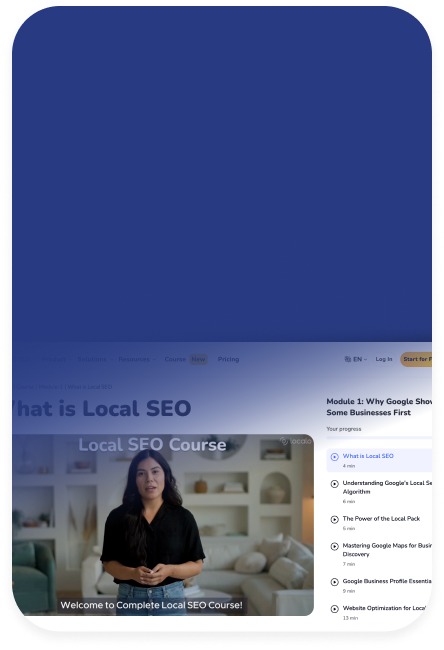
Ready to get more customers calling?
Take FREE Local SEO Course
Available now in English
CMS (Content Management System) - is a content management system for a website. It is software that enables an easy and friendly way to create, edit and update content and information on the website without technical knowledge.
What a good CMS should do?
A good CMS should allow for technical changes in your website, which significantly impact SEO, and thus the indexing of the site, visibility in search engines, or analytics configurations. It should give you the ability of:
- Comprehensive content management (structure, font, bulleted lists, headings, bold, link editing, adding and describing images, tables, etc.)
- Editing without knowledge of HTML
- Managing subpage URLs
- Possibility to install additional modules for different content types (chat, form, map, photo gallery, fanpage, comments, related pages, ratings/reviews, etc.).
- Fast, intuitive, and easy to use.
Different types of content management systems
- Open Source (e.g., WordPress) - a system with access to files and source code so that you can manage content, change the templates, and generally customize the page to your needs.
- Subscription system, SaaS (e.g., Shoper) - software that many customers share, so they do not have access to the code of the site. It is possible to interfere with the template appearance and basic content management system.
- PrestaShop - is one of the most popular CMS systems for companies to manage their online stores (e-commerce business). The application has an extensive panel and a large number of valuable features.
- WordPress - it is intuitive and easy to use. A vast number of free themes and plugins are available.
- Joomla - works great as a content management system for a website. Again, the software provides access to the source code and many add-ons.
- Drupal- This allows you to make various modifications and efficiently manage the site through an extensive administration panel.
- Blogger - This is software for blog websites (free). Ideal for beginner bloggers.
- Shoper - It enables easy creation, configuration, and management of e-commerce. The application is constantly updated and developed with new functionalities.
- Magento - popular store script distinguished by a comprehensive platform. It is ideal for managing a store with a large number of products. A large community supports them.

Article author:
Sebastian Żarnowski
Co-founder & CEO
I have been involved in local marketing for years, starting my career at KS Agency, where I also initiated the Local SEO department. Currently, as a co-founder of Localo, I am developing a tool that helps local businesses reach their customers. I share my knowledge through blogs, webinars, social media, and YouTube videos. I focus on authenticity, a practical approach, and effectiveness to support the growth of local businesses and help them connect with their customers more effectively. I value unconventional thinking and am constantly seeking new solutions in marketing.
![What is CMS - Content Management System - [Marketing Dictionary]](/assets/img/dictionary-background.webp)